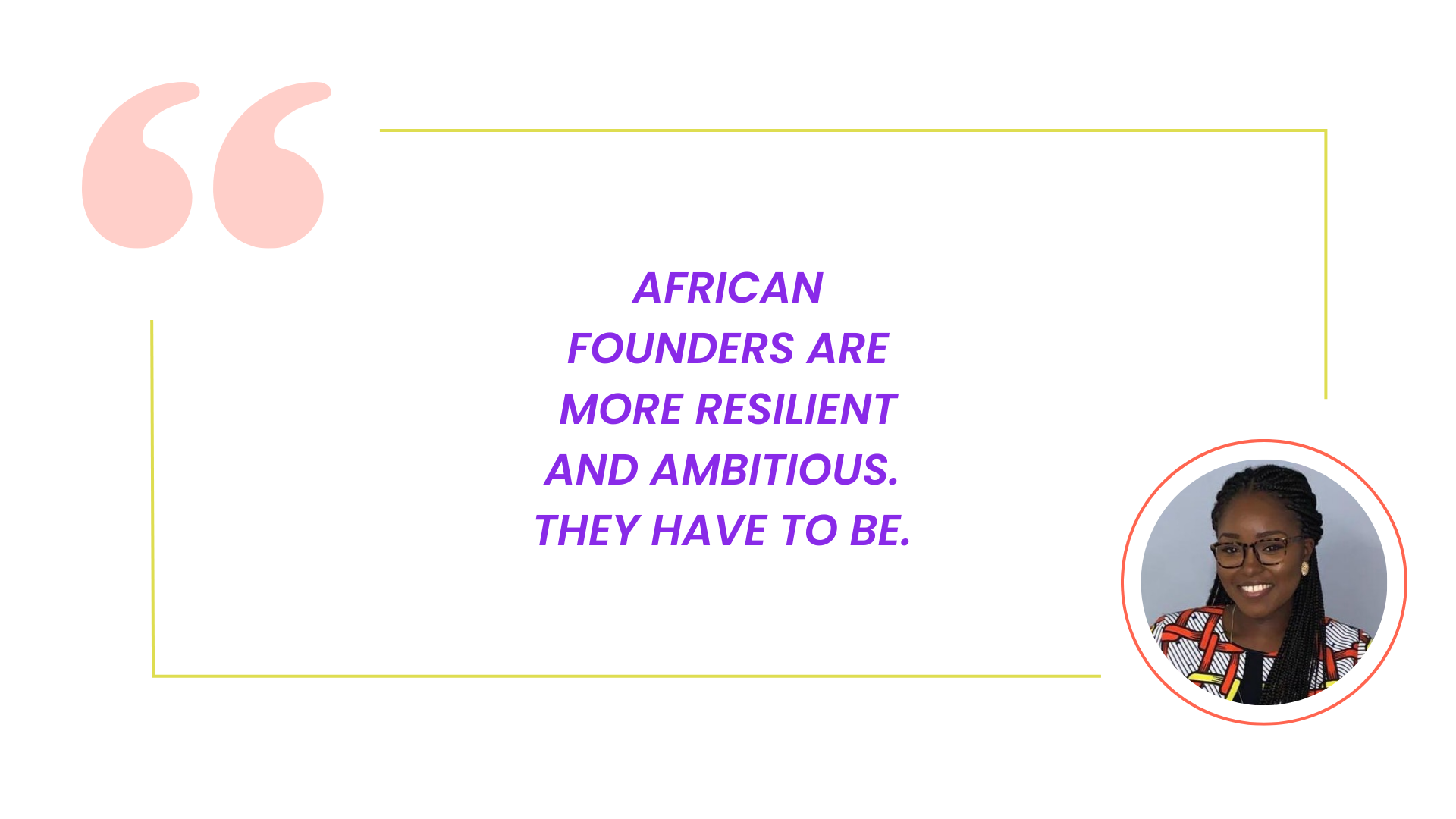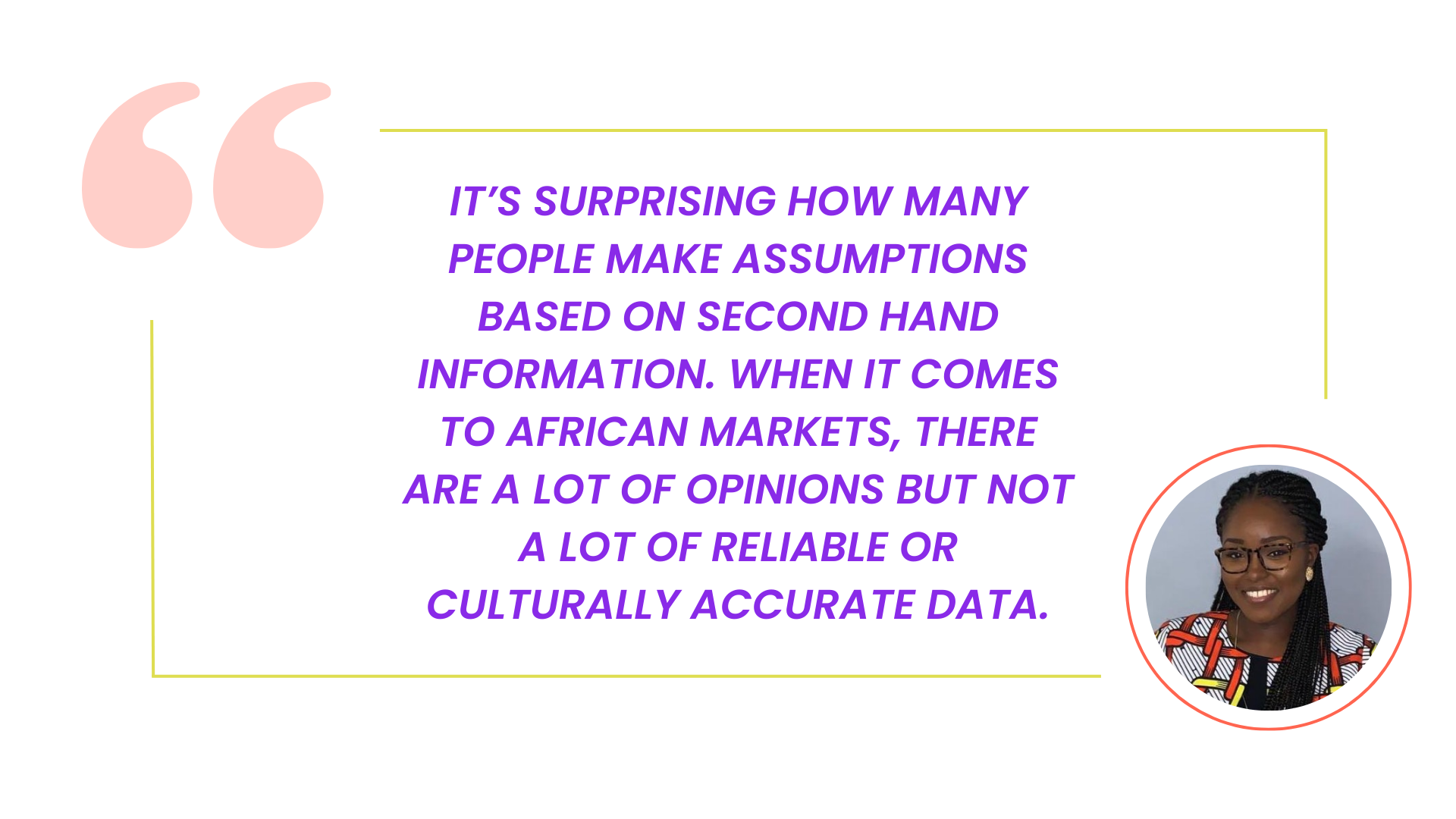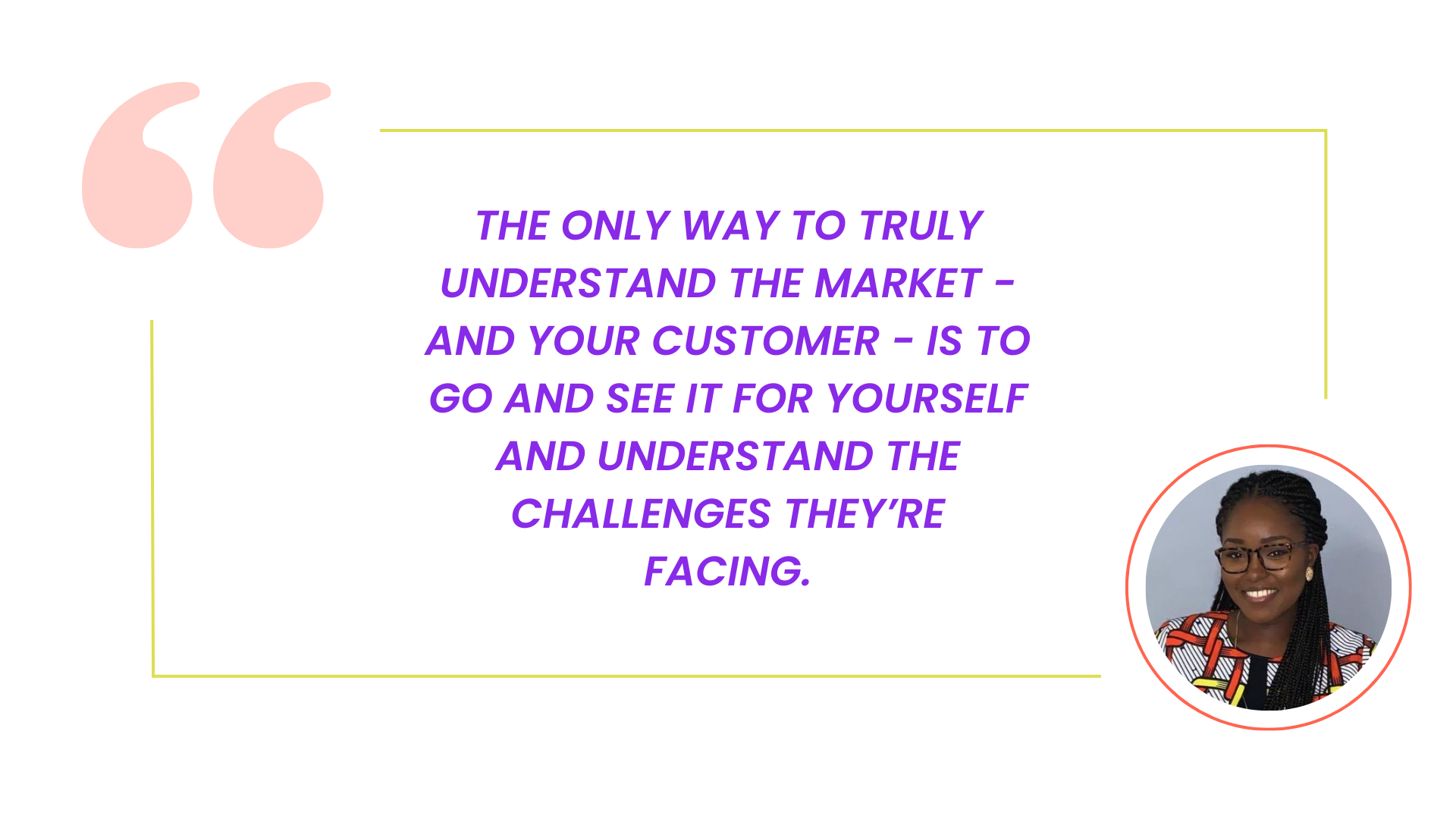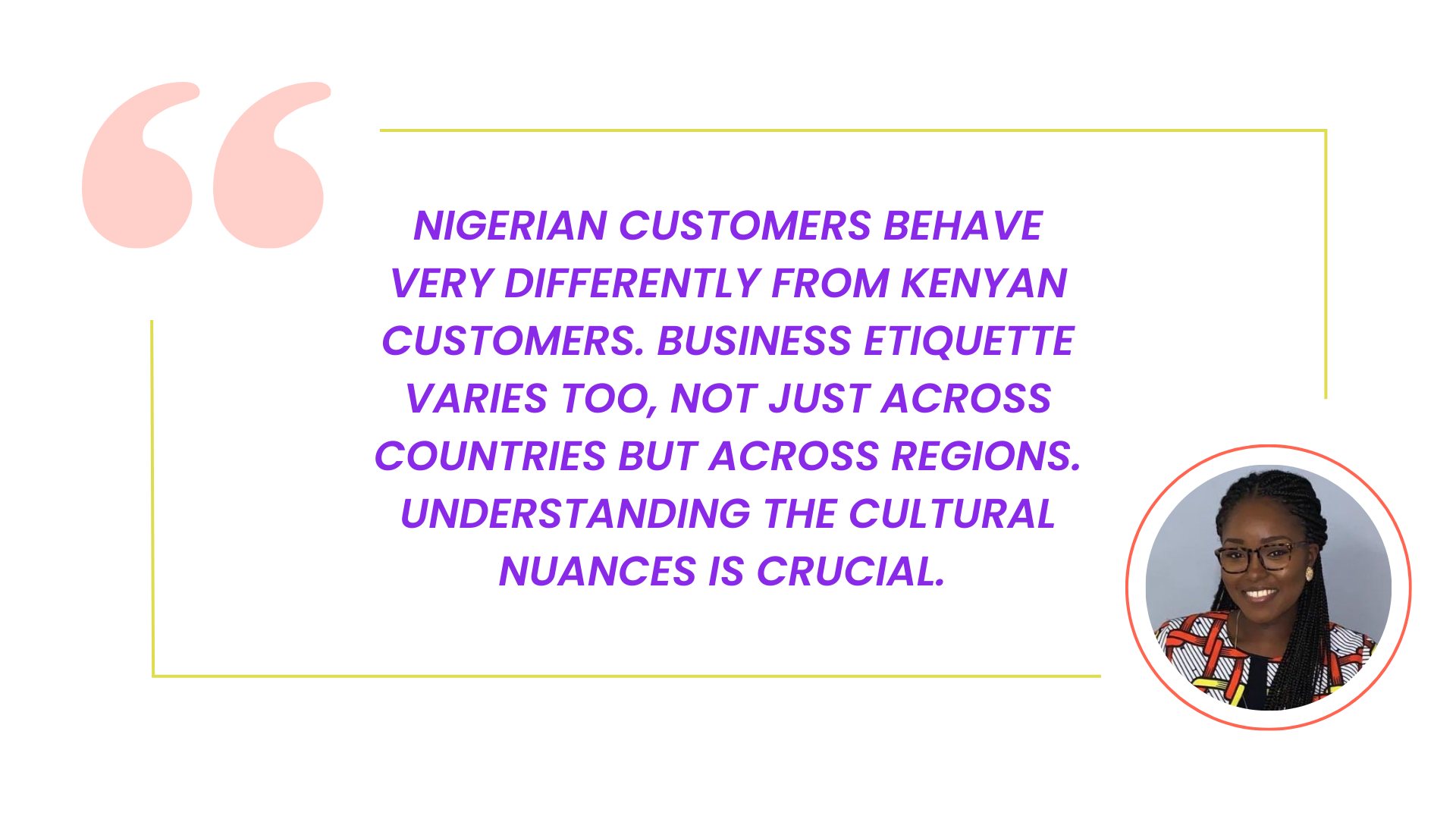Bridging Borders in Tech: A Conversation with POV’s Precious Oyelade
19 May, 20259-10 minsLet me introduce you to Precious Oyelade…Precious is no stranger to breaking boundaries. Fro...

Let me introduce you to Precious Oyelade…
Precious is no stranger to breaking boundaries. From her early days at the University of Cambridge to pivotal roles across global tech and VC ecosystems, she’s been driven by one clear purpose: to shift perspectives around African identity and amplify underrepresented voices on a global stage.
After university, Precious spent time running residential programs for international students when she noticed a glaring gap: African students were severely underrepresented. Determined to change that, she left behind a career in marketing and set her sights on Nigeria. Like many others, COVID-19 temporarily delayed that move but opened another door: Precious transitioned into PR and communications at Wimbart, helping African tech startups position themselves for growth and global investment.
Her work helping startups tell their stories sparked a deeper curiosity about venture capital, leading her to a role at Seedcamp, a European VC fund. Here, she supported founders by helping them navigate the critical early stages of their journeys. But her heart was still with the African tech ecosystem. Specifically, she wanted to support founders who were building tech in emerging ecosystems and shared her desire to challenge the status quo.
That led her to lead programmes at Google for Startups, where she ran accelerators and capacity-building programmes such as the Black Founders Fund and the Women’s Health programme, helping level the playing field for underrepresented founders by providing access to the resources, networks and capital needed to take their already proven ideas to the next level.
In early 2024, Precious took everything she’d learned in her career so far and launched POV – an implementation partner reimagining how African innovation shows up on the world stage. By connecting startups with corporates, capital allocators and policymakers, POV unlocks partnerships and insights to drive sustainable growth.
At its core, POV is about challenging outdated narratives and widening the lens on the growth available on the African continent, driven by African entrepreneurs with contextual understanding. With this mission in mind, we sat down with Precious to chat about the African tech ecosystem, navigating cross-cultural investment, and the power of storytelling in scaling globally.
For readers with no prior knowledge, how would you describe the African tech space?
It’s dynamic, it’s growing, and it’s big, but like much of the world, it’s also dealing with a significant funding gap. One key thing to understand is that the African continent is often split into two broad regions: North Africa, which is closely linked with the Middle East, and Sub-Saharan Africa, where I operate.
In Sub-Saharan Africa, sectors like FinTech are growing rapidly – especially anything related to payments and moving money across borders. Remittances, for instance, are huge. And once we’re able to solve payment issues, we’re able to unlock opportunities in logistics, EdTech and even ClimateTech.
There’s also a strong focus on talent. We’re seeing a growing pool of engineers, UX and UI designers and product managers who are building for both local markets and international clients.
Interestingly, there’s also a growing expat presence in the tech scene. People like me, whose families migrated at some point, or those who studied abroad and are now returning to the continent to build solutions to problems they’ve experienced firsthand.
It’s a vibrant, forward-thinking space, but at the same time, it’s underfunded. Despite the potential, when you look at how global funding is distributed, Africa still only receives around 5% – a tiny share compared to regions like the US, China or India.

Is there a particular area of tech that you’re most passionate about?
I wouldn’t say I have a favourite, but I’m especially interested in logistics. Right now, it’s one of the biggest challenges in Sub-Saharan Africa, but it also has the potential to unlock the biggest opportunities.
The movement of goods and people hasn’t been resolved yet. Even the movement of food doesn’t work efficiently, especially across borders. To combat this, startups have emerged that, for example, aggregate trucking services – like Uber, but for large volumes of commercial goods. Companies like Kobo360, Haul247 and Chargel have built platforms that connect available trucks with goods that need transporting.
For example, if a truck delivers fuel from point A to point B, these platforms assist in finding cargo for the return journey rather than driving back empty. This helps reduce waste, lower costs, and improve supply chains for essential items such as food, water, and fuel.
Your company, POV, helps African startups expand into the UK, and UK companies enter African markets. Where do you see the biggest cross-border opportunities?
Exactly. We’re an implementation partner that helps African innovations go global and global ventures establish an African presence.
FinTech and cross-border payments remain a big pain point for companies and individuals. A lot of FinTech companies are expanding globally, particularly into the UK. Outside of remittances, there are FinTech platforms that help migrants build credit histories. For example, if you move from Nigeria to the UK, there’s a need to build a credit history, which is a major challenge for most migrants.
On the UK side, companies are looking for strategic partners to help them with KYC and identity verification in market. Others are trying to sell directly to companies and consumers in Nigeria and beyond due to the huge population potential.

What would you say are the biggest cultural or commercial differences between startup culture in Africa and startup culture in the UK?
Honestly, having moved to Lagos in October 2024, I can say that African founders are more resilient and ambitious. The reality is, they have to be. On the ground, a lot of basic infrastructure still doesn’t work. Access to electricity, internet or even payment systems is inconsistent, so founders in Africa are often building everything from scratch and facing challenges that entrepreneurs in more developed ecosystems don’t have to.
For example, if someone wants to build a platform for SMEs, they often also have to build their own payment delivery gateway because the local infrastructure isn’t there yet. Before Stripe acquired Paystack, there weren’t even reliable payment solutions for many small businesses in Nigeria. In that sense, African founders have the resilience to build everything that a startup needs, rather than being able to source a solution and slot into one aspect of the value chain.
There’s also a difference in narratives. African founders tend to model their storytelling style on Silicon Valley – big vision and bold ambition. Europe is still seen as more conservative, so the tone can feel more cautious.
Then there’s the economic side. Many African startups incorporate US systems (usually Delaware) to attract international investment, since financial systems in their home countries are seen as higher risk. This creates a problem when having raised funds and secured valuations in US dollars, but they then generate revenue in local currencies, which over the past couple of years have seen monumental volatility and depreciation.
The Nigerian Naira, for instance, has dropped almost 70% in the last few years. So even if a startup grows its revenue locally by 200%, in dollar terms, those gains look flat, meaning that from a valuation point of view, these companies haven’t increased in value. This volatility in the local markets makes it even harder for founders to increase the value of their businesses, because although their businesses are growing in real terms, they’re not growing in relative terms.
How are investors responding to that?
Some are adjusting by factoring heavy discounts on valuations. A good example is Moniepoint, which reached unicorn status at the end of last year. I don’t believe many people would disagree with me that they would have been valued even higher had they not been an African company or if the Naira hadn’t devalued.
Others are looking to those with local relationships and local context. They’re exploring local currency financing to avoid startups taking on dollar debt they can’t repay.
There’s growing interest in creating more sophisticated financial instruments to help founders raise funds without being exposed to currency risk. These are strong businesses; it’s just about supporting them in their growth journey whilst they’re still generating revenue in local currency.

What’s the most common mistake UK businesses make when entering African markets, and how can they best avoid them?
The first and probably biggest mistake is just not visiting. It’s surprising how many people make assumptions based on second-hand information. When it comes to African markets, there are a lot of opinions but not a lot of reliable or culturally accurate data.
You’ll hear a lot of people throwing around the same numbers, such as “Africa will have 40% of the world’s population by 2100” or “60% of the population is under 25,” which paints a picture of a young, dynamic continent. That’s all true, but if you dig deeper, how much of that population earns over $1 a day? How many people earn above $15,000 a year?
These nuances really matter. There is a need to assess purchasing power. The only way to truly understand the market – and your customer – is to go and see it for yourself and understand the challenges they’re facing.
The second mistake is assuming that Africa is monolithic. It's not. Nigerian customers behave very differently from Kenyan customers. Business etiquette varies, too, not just across countries but across regions, so understanding the cultural nuances is crucial.
The third mistake is underestimating how long it will take to set up properly. It’s never as quick as you think. My advice is to work with local partners, like POV, and bring in legal experts who understand employment law and regulatory compliance in the specific sector you’re entering.
Flipping it around, for African founders looking to enter the UK market, what should they be thinking about in terms of market fit? What are the key operational, cultural, and commercial differences they should prepare for?
When moving into a developed market like the UK, it’s really important to do a cost-benefit analysis because operational costs are higher – everything from salaries to rent to taxation is more expensive.
Compliance is another big one. The cost is much higher, and the UK has much stricter enforcement when it comes to regulation, so setting up there means being really on top of the legal requirements from the get-go.
Then there’s the question of demand. Is there genuine demand for your product in this market? Just because something has worked well in another market doesn’t mean it will translate, so deep market analysis is essential. What do customers want here? How do their needs differ? Who are the competitors, and how are they pricing?
It’s also worth thinking strategically about where you want to land in Europe. Historically, the UK was seen as a good landing spot to then expand into the rest of Europe, but the market has always been fragmented and post-Brexit, the question is whether it makes more sense to land elsewhere for easier access to EU markets, depending on what the product is.

That’s such an important point. On a related note, you mentioned that a lot of African founders model their businesses on Silicon Valley. Given how different the European tech landscape is (more reserved, more cautious), does that pose challenges when they expand into the UK?
Not necessarily challenges, but definitely considerations. The US startup attitude tends to encourage boldness. Founders are often more outwardly ambitious in how they talk about scale, which I think is a good thing.
But there is less capital available in the UK and Europe than in the US. That means that African founders need to consider whether European VCs can back their vision in the same way US investors might. Do the numbers support the ambition? And is the capital here bold enough to take that risk?
In many cases, it may be easier to raise in the US, simply because there are more VCs and more capital. However, it’s mainly about where you have the best chance of acquiring customers, not just capital. Wherever the customer acquisition is then best positions you and your investors for exit opportunities, which is what VCs are ultimately looking for.
And finally, we spoke previously about how valuable networks are when it comes to investment. For founders looking to raise international capital, how can they tap into the right communities, especially if they’re not physically in those spaces?
Building an international network is absolutely essential. The good news is, it’s more accessible than ever. Start with your existing network – look at your contacts, your LinkedIn – who do they know? Can anyone introduce you to relevant investors or ecosystem builders?
Then look at global accelerators like Techstars or Y Combinator, or even corporate programmes – Barclays, NatWest, J.P. Morgan, Morgan Stanley, Bank of America all run initiatives that connect startups to capital, especially across borders.
Visibility is also key. The more visible your business is, whether that’s through speaking at events, sharing insights online, or being seen as a thought leader in your space, the more likely investors and customers are to either find you or say yes when they’re introduced to you.
You want people to feel like they already know what you’re doing, that they can trust in the vision and the traction, even if they’ve never met you in person.
If you’d like to learn more about POV, visit pov-shift.com or follow Precious on LinkedIn.
Want to hear from more founders shaping the future of tech? Subscribe to The Stack.
Precious is also featured in our white paper, The Rise of Women in Tech, coming soon!
The bottom line
Hiring contractors shouldn’t create more work. With Propel, you get flexible, on-demand talent while we manage the admin behind the scenes so you can stay focused on what you do best while we take care of the rest – onboarding, contracts, compliance, and payments.
Your contractors get paid on time. You get one invoice.
Curious how we can help your team scale?



